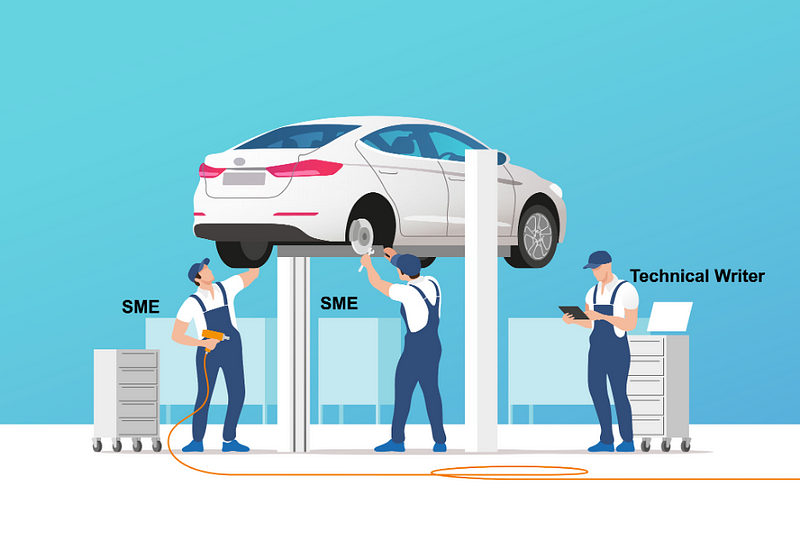Working with SMEs
I’m convinced that how we interact with colleagues is just as important (maybe more important) to our job security than our actual work. We can do brilliant work but if we’re jerks, it’s “Exit, stage left!” Alternatively, we can do adequate work, but if we’re genuinely helpful and cooperative, others encourage us to do better, as friends or even champions. In 2022, “soft skills” are more important than ever.
So what’s a SME and what’s important about working with them?
SME, pronounced “SMEE”, is an acronym for “Subject Matter Expert.” This term is used in many industries. If you work as a tech writer, you’re going to hear this term (sometimes pronounced: “S-M-E”) a lot.
Who are SMEs?
SMEs are the brain trust of an organization. They are where knowledge and wisdom live. It’s imperative that we capture their knowledge in documents so that the company can optimize its operations.
By doing so, we ensure that the SME doesn’t become a “single point of failure” (to use a Business Continuity term). Without this, if something happens to that person, the firm will suffer harm — sometimes lasting harm.
A metaphor for the relationship?
SMEs are the prime knowers and doers in the organization. Technical writers document the SMEs’ “what” and “how.”
The illustration (below) depicts a technical writer documenting the work of two SMEs on an automobile.
What does this technical writer need to know?
● He, at least, needs to know the names of tools, parts, and any affected systems, so he can document what the SMEs are doing. (What if he were to interrupt the SMEs while they’re working to ask for the name of a tool or a part? That would not help the working relationship!)
What does the SME need to know?
● The SME needs to know how to fix the car (and actually perform the work). And, by communicating with the technical writer, he can help offload the documentation required for his job.

How do SMEs view technical writers?
Most technical people are fortunate to have the support of effective technical writers. Without technical writers, documentation will be on them if they don’t get this type of help.
But, some SMEs may not have had positive experiences in the past. Some technical writers expect documents to be completed so they can add special fonts and formatting flourishes. Andrew Plato, an engineer who became a technical writer, called these technical writers “font fondlers.”
YOU are a writer. Editor. Proofreader. And publisher. You’re not a “font fondler.”
TYPES OF SMEs IN THE WILD*
* These caricatures are used to illustrate certain tendencies. They should not be taken literally.
These portraits are based on 21 years of direct experience. I’d be doing you a disservice to suggest SMEs are generally helpful and supportive of your work. However,
the tone of your work with SMEs is likely to depend on your company’s management and the value they put on good documentation practices.
Unicorn SME: Available, pleasant, and consistently helpful. (Rumored to exist in the wild.)

Regular SME: Sometimes available, pleasant, and helpful. Sometimes abrupt, overstressed, and avoidant. (A sizeable majority.)
Superior SME: Believes you should bow or genuflect before speaking. Secretly wishes you’d make the coffee or serve them breakfast to underscore their superior value to the company (and the world). Compensate for whatever inferiority troubles them by snubbing you, behaving rudely, or just being a regular pain in the derriere. (Endangered, but still visible in the wild.)

Chicken SME: Usually timid, though that’s the last thing they want you to see in them. Terrified of sharing their knowledge and “endangering” their jobs (by making themselves replaceable). Will find a thousand ways to avoid helping you document what they know. (Endangered, but dangerous when confronted with their greatest fear.)

In fairness, SMEs are often overworked, stressed, and short of time.
Whether we get the information we need usually depends on our behavior with them.
HOW TO HELP SMEs BE THEIR BEST SELVES
Listen actively
It’s a cliche but so true. And a good SME can listen so they’ll appreciate your attentiveness.
Tips for listening actively:
● Repeat the last few words of what a person says to you (mirror it back to them).
● Paraphrase what you’ve heard.
● Always take selective notes (do not take word-for-word notes).
Set expectations on deliverables and deadlines
You’re going to be held to delivering on time so recruit them by sharing your timelines and asking them “Do these dates seem undoable (or “unrealistic”) to you?” They will nearly always say “Of course not” because people tend to feel much more secure saying “no” than saying “yes.”
Make learning their language your mission
By language, I mean terms and concepts. Know their vocabulary because you’re going to be using it. After all, the effective use of these words is your domain of expertise. If you resist learning their language, you may become defensive of your ignorance and not very helpful to them.
Respect for them and their time usually translates into them respecting your work.
Never presume
If you catch yourself frequently saying “Oh, I thought that…” to a SME, you might be on a presumption roll. This usually means you’re not as prepared as you might be, which leads to:
Always be prepared before speaking to SMEs about their “S”
Do your homework before meetings and interviews. Don’t come unprepared.
Never start from scratch
SMEs leave tracks. Of the hundreds of documents I’ve worked on, only a few were built “from scratch.” There is (almost) always a draft, or outline, or even a bunch of bullets collected in the past — even if it’s an outline written on a cocktail napkin! It’s better than starting from scratch. Use what already exists to your advantage
Match their preferred communication style
Try different modes of communication. (Email instead of chat. Maybe a phone call.) People respond differently to different forms of communication. You can ask them if they have a preference or just try different types to see what works best.
Impress with your interviewing skills
Again, do your homework. (Never come unprepared.) There’s probably no greater an insult than wasting a SME’s time by being unprepared.
- Have questions ready. Even if they’re basic. Writing them down will help you stay focused and will impress the SME.
- Record when possible. I use Otter.ai when I can. But make sure you check with your SME first. You can say you’ll delete it shortly after the meeting. (If you say it, do it.)
- Send recap notes if possible — allow them to view or respond to your notes. This is a good time to ask for clarification on anything you’re concerned you may not have captured (you can use bold red to highlight the section in the notes).
DEALING WITH CHALLENGING SMEs
There are difficult SMEs. Some may be at a bad juncture in their job or personal life. Some are just jerks.
Resistance can take the form of:
● Not giving you time.
● Missing or postponing meetings (avoidance).
● Not responding to specific, reasonable requests.
Methods for handling this include:
- (If you haven’t already) confirm you have your manager’s support (so you can escalate if necessary).
- Sell them with a plain-spoken, commonsense explanation that you can save them time and stress by helping with documentation.
“What if I could save you hours of time on documentation that the firm requires?”
(Who’s going to argue with that?) - Try to be both patient and persistent. Are they being dismissive? Document every unhelpful interaction in a calm, objective manner in a separate document. This will help should you need to escalate.
- After repeated avoidance, escalate to your manager. This is the “nuclear” option and should be your last resort.
GOING ABOVE AND BEYOND
If you have the time and patience, or if you sense benefits to being super keen, you can do the following prior to working with a SME:
● Look up their LinkedIn profile. Scan their work history, publications, and any personal references. Most people love talking about their favorite subject (themselves). If you can plan a few “break-the-ice” questions about their background, even better. But your questions need to be sincere.
● Collect reference material (in your quest to master their terms/concepts). Tell them about your efforts to understand (software development, or virtual servers, or digital security, etc…). Then ask them if they can suggest a “bible” or single source of information that might be helpful. Again, your interest has to be sincere.
